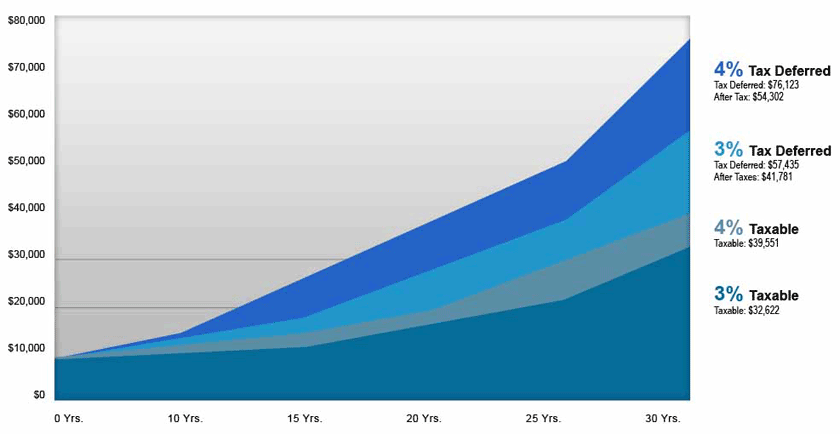What is a Fixed Annuity?
A Fixed Rate Annuity gives you the stability and consistency of a fixed interest rate that is determined by the insurance company and is guaranteed never to renew below a stated minimum rate.
Key Takeaways
What is a Fixed Annuity and How Does It Work?
A fixed annuity is a type of financial product designed to provide ongoing financial stability during your retirement by offering a guaranteed and consistent income stream. In order to purchase a fixed annuity, you can contribute a lump sum or make a series of payments to the insurance carrier.
In return, the insurer promises a fixed interest rate be paid to you on a monthly, quarterly, or annual basis, either for a predetermined period or even for the rest of your lifetime. Fixed annuities have taken the industry by storm for their predictability and absence of risk, making them a prevalent choice for conservative investors seeking reliable income.
This type of annuity provides a predictable return and a guaranteed stream of fixed payments over the life of the Annuity. Depending on the provision of the particular Annuity, Annuity owners can make one contribution or many contributions.
- Guaranteed Rate — A fixed interest rate is locked in for a period of your choosing, like a Certificate of Deposit or CD
- Retirement Income — Ideal source of secure monthly retirement checks. Retire with peace of mind and steady growth
- Solid Return — Competitive interest rates are usually higher than those of CDs or money market accounts
- Inheritance Options — Bequeath money directly to loved ones probate-free
- Liquidity — 10% free withdrawals, withdrawals of interest or "Annuitization" options give you access to your money when you need it
Accumulation and Payout of Fixed Annuities
Fixed annuities operate in two key phases: the accumulation phase and the annuitization (also known as distribution or payout) phase. During the accumulation phase, your contributions grow at a guaranteed interest rate, which is currently around 6% for fixed annuities. However, the exact amount will depend on the insurance company chosen.
The period during which your funds accumulate within the annuity typically lasts for several years, with the precise timeframe being specified in your contract’s terms. At the end of this period, the annuitization phase begins, and the insurance company provides you with a regular income stream. These payouts can be structured in a multitude of ways, the most common being monthly, quarterly, or annually, and can be set to last a specific number of years or the entirety of your life.
PRO tip
When choosing a fixed annuity, consider adding optional rider features, such as inflation protection. This can help safeguard the purchasing power of the investment throughout your retirement, ensuring your income keeps pace with rising living costs.
Types of Fixed Annuities
Traditional Fixed Annuities
Traditional fixed annuities have been used for centuries, providing a guaranteed interest rate for a predetermined period and delivering predictable returns on your investment.
Fixed-Indexed Annuities
This annuity type offers interest earnings based on the performance of a particular market index, such as the S&P 500, while still promising a guaranteed minimum return in the case of market recessions.
Read more about Indexed Annuities.
Multi-Year Guaranteed Annuities (MYGAs)
MYGAs offer a fixed interest rate for a multi-year period, often ranging between three and ten years, after which you are given the option to either renew the contract or receive payouts.
| Feature | Traditional Fixed Annuity | Fixed-Indexed Annuity | Multi-Year Guaranteed Annuity |
|---|---|---|---|
| Interest Rate | Fixed | Varies, with a guaranteed minimum (known as a floor) | Fixed |
| Risk Level | Low | Moderate | Low |
| Return Potential | Unvarying/Stable | Higher, oscillates depending on market performance | Unvarying/Stable |
| Suitable For | Risk-Averse Investors | Investors looking for moderate risk and higher profit margins | Risk-Averse Investors |
Who Should Get a Fixed Annuity?
Fixed annuities are ideal for investors looking to secure a predictable income stream in retirement. This annuity type may be best-suited to cautious investors who prioritize stable returns on low-risk investments and safeguards against longevity (outliving savings). The absence of risk (especially in comparison to other investment types) and income assurances provided by fixed annuities could also help diversify your overall investment portfolio with a stable, interest-bearing product.
Pros and Cons of Fixed Annuities
Pros
- Guaranteed Income for Life: Provide a reliable and steady stream of income.
- Low Risk: Offer a fixed interest rate and remain unaffected by market downturns, minimizing investment risks (considered to be one of the safest investments for retirement).
- Tax-Deferred Growth: Earnings accumulate tax-deferred within the annuity until withdrawals begin.
- Flexible Payout Options: Various payout structures are offered to further meet your needs and preferences.
Cons
- Limited Liquidity: Early withdrawals may be subject to fees and tax penalties, affecting your overall return on investment.
- Inflation Risk: Since payouts come with a fixed interest rate, you may lose purchasing power over time due to inflation.
- Lower Returns: As this annuity type is not directly linked to the market, returns may be inferior to other investment options that offer higher growth potential.
- Fees & Charges: May include administrative fees as well as surrender charges in the case of an early withdrawal.
Fixed Annuity Risks
While fixed annuities are considered to be a low-risk investment on paper, there are still some considerations to be aware of. One of the primary risks is inflation, as fixed payments could lose their purchasing power over time if inflation rates were to rise significantly. Additionally, there are liquidity risks associated as well, since access to funds during the surrender period (or before the age of 59 ½) is likely to lead to tax penalties and surrender charges. Such additional costs can greatly affect the value of your fixed annuity. Another risk to reflect on is the financial stability of the insurance company; you always want to be sure the provider you go with can fulfill its obligations, making it essential to select a reputable and financially strong insurer to mitigate this risk.
Fixed Annuities in 2026
In recent years, fixed annuities have been skyrocketing in popularity amongst retirees, with their sales numbers consistently increasing. Throughout the first half of 2026, this growth has persisted, with a 4% upsurge in total fixed annuity sales in comparison to the previous year. With ongoing economic uncertainties, the appeal of guaranteed returns and a constant income stream is only intensifying. With interest rates remaining stable, fixed annuities have become a beacon of predictability within the retirement planning sector. As more and more retirees seek secure retirement solutions, this annuity type is only expected to rise further in sales numbers.
Alternatives to Fixed Annuities
For those seeking alternatives to fixed annuities, there are several options to consider. As the key downside to fixed annuities is the lack of profit potential, investors can turn to other annuity types to address this concern. For instance, variable annuities can provide higher returns by linking your investment to the market, though they come with more associated risks. Looking beyond the annuity market, bonds could also provide a fixed income with varying levels of risk and return depending on the options available. Certificates of deposit (CDs) are another low-risk option with guaranteed returns over a fixed period. Lastly, mutual funds may offer diversification and growth potential, albeit without the guarantee of a regular income stream.
Fast fact
Fixed annuities offer guaranteed interest rates that are generally higher than those of savings accounts or CDs, providing a better return on your initial principal invested.
How Are Interest Rates Set?
During the accumulation period, your money earns interest. Fixed annuities rates have different rates and are dependent on several factors. The insurance company sets the interest rates, which can change.
Minimum Guaranteed Rate
Look for the minimum guaranteed interest rate. This is the absolute lowest rate your Annuity can earn. This rate is stated in the contract.

Current Interest Rate
Interest on your Annuity is credited based on the current interest rate. If at any time your annuity's minimum guaranteed interest rate is higher than the current interest rate, they will always credit your annuity with the guaranteed rate.
- The current interest rate when you first buy your Annuity is called the initial interest rate. Ask how long the company promises to pay this initial interest rate; in many Annuities, the initial interest rate only applies to the first year you own the Annuity. When the rate changes, it may be lower.
- Once the initial interest rate period ends, the company credits interest to your Annuity based on the renewal interest rate. The disclosure tells how the company will set the renewal rate and how often it can change. The renewal interest rate may be lower than the initial interest rate.
Bonus Interest Rate
As an incentive to buy and keep an Annuity, some companies offer a bonus interest rate. A bonus interest rate is higher than the current interest rate, but you must qualify and meet certain conditions in order for the insurance company to apply the bonus interest rate. For example, if you take a lump sum at maturity or take an early withdrawal, you may lose the bonus interest rate.
Multiple Interest Rates
Multiple interest rates apply to Flexible Premium Annuities. These contracts may apply different interest rates to each premium you pay.
Important!
Always try to review the financial strength ratings of the insurance company issuing your fixed annuity to ensure they can meet their future payout obligations.
Are There any Fees Associated with My Annuity?
Annuities have fees associated to the cost of selling and management. Fees are covered by deducting them directly from the contract value, or they may be reflected in lower interest rates.
It is important to read the disclosure form and ask your financial agent or the annuity company to help you identify any costs that may apply to your Annuity. Some examples of charges, fees and taxes are:
- A contract fee is a flat dollar amount charged either once or annually
- A transaction fee is a charge for each premium payment or other transaction
- A percentage of premium charge is a charge deducted from each premium paid. The percentage may vary over time
- Some states charge a premium tax on Annuities. The insurance company pays this tax to the state. The company may subtract the amount of the tax when you pay your premium, when you withdraw your contract value, when you start to receive income payments or when it pays a death benefit to your beneficiary
Surrender Charges
You may take out all or part of the money in your Annuity at any time during the accumulation period but you'll likely pay a surrender charge. The contract and the disclosure tell you how much you can take out without paying a charge and if the charge no longer applies after you've had the Annuity a while.
How Do I Know If A Fixed Annuity Is Right For Me?
The questions listed below may help you decide what the best fixed annuity might be for your particular situation. You should consider what you want to accomplish and what your goals are for the annuity. You also need to think about how much risk you're willing to take.
These Are The Questions You Should Ask Yourself:
- How comfortable am I with risk?
- How long can I leave my money in the Annuity?
- Does the Annuity let me get money when I need it?
- How much retirement income will I need in addition to what I will get elsewhere?
- After I buy the Annuity, how much money do I need to have available to cover major expenses and emergencies? How much would I have for these expected expenses?
- Will I need income payments only for myself or for myself and someone else?
- How soon will I need income payments? How much retirement income will I need in addition to what I'll get elsewhere?
- If the Annuity only earns the minimum guaranteed interest rate, will that be enough income to meet my needs?
- Am I comfortable with the length of time that I'll pay surrender charges if I withdraw money from the Annuity?
These Are Questions You Should Ask Your Financial Company Or The Insurance Company
- Is this a single premium or flexible premium contract?
- What is the guaranteed minimum interest rate?
- What is the initial interest rate and how long is it guaranteed?
- Does the initial rate include a bonus rate and how much is the bonus?
- If there's a bonus, when is it credited and on what amount?
- Do I lose any bonus if I take a lump sum rather than annuitize my accumulation value? Are there other ways I could lose the bonus?
- What renewal rate is the company crediting on Annuity contracts sold last year?
- How much are the withdrawal charges, surrender charges and other penalties? How long do they apply?
- When is the earliest I can get money out of the Annuity and how much can I get?
- How much can I withdraw without paying surrender charges or losing interest?
- Is there a Market Value Adjustment (MVA) feature in my Annuity?
- What other charges may be deducted from my premium or contract value?
- If I take a lump sum and surrender the Annuity, will the accumulated value or the way interest is credited change before I do this?
- What happens to the money in my Annuity if I die?
- How long is the free look or right to return period?
Final Points To Consider
Before you decide to buy an Annuity, remember to review the contract terms and conditions, because these vary with each Annuity contract.
It is also important to consider your needs depending on your age, and what you want to accomplish, to make sure that the Annuity is right for your situation. Withdrawing money from your annuity means you may have to pay taxes and/or penalties. If you're replacing an Annuity, you may have to pay direct or indirect costs associated with the new annuity. You may also have to pay surrender charges on the old Annuity if applicable. If you're selling another asset, are there penalties associated with the sale? Will you have to pay taxes on the sale? Annuities are intended to be a long-term product. Generally, you should keep it long enough to avoid paying any penalties.
If you're buying an Annuity to fund an IRA or other tax-deferred retirement program, there may be some additional advantages using this approach. Remember to ask your financial advisor if there any.
Upon delivery of your Annuity contract, READ IT CAREFULLY!! Also, read the insurance company disclosure provided with your annuity. Ask your Financial Company for an explanation of anything you don't understand. You want to do this before any free look period ends.
Any bonuses that are included an annuity, may seem very attractive, however it is important to consider the costs and benefits associated with them. Bonuses can help boost your Annuity's value, but it's important to understand how they work. In general, Annuities with bonuses have higher surrender charges and the surrender charges apply longer than in Annuities without bonuses. In addition, all things being equal, an Annuity with a bonus may have less potential for gains than a non-bonus Annuity. Make sure you understand the terms and conditions of any bonuses you're considering.
Frequently Asked Questions About Deferred Annuities
What is the minimum amount of funds I can invest into a fixed annuity?
The minimum investment for a fixed annuity can differ depending on the provider, but it typically ranges between $5,000 and $25,000. It is pivotal to check with individual insurance companies for their specific requirements.
Can I withdraw funds from a fixed annuity before the accumulation phase ends?
Such action is typically discouraged, as early withdrawals may incur surrender charges and a 10% tax penalty. It’s indispensable to understand the specific terms of your contract before making any withdrawals. In certain scenarios, such as an emergency, the contractual agreement may specify that withdrawing a given amount is permitted.
How are fixed annuities taxed?
Any earnings gained from a fixed annuity grow tax-deferred during the accumulation phase, meaning they will not be subject to taxation until withdrawals begin. However, when funds are withdrawn, they are typically taxed as ordinary income.
Are fixed annuities considered to be a good investment for retirees?
Fixed annuities are an ideal investment for retirees looking for financial stability, low risks, and tax-deferred growth. On top of this, fixed annuities can serve as a layer of protection against longevity risks, ensuring you never outlive your retirement savings.
How can market fluxes impact variable deferred annuities?
This annuity type is market-linked and, consequently, is subject to the irregularities of the market. Although this option comes with more risk, it also offers the potential for much higher returns based on market performance.
- Carey, M. (2018, August 1). The Best Fixed Annuities Available in 2018. https://www.forbes.com/sites/mattcarey/2018/08/01/the-best-fixed-annuities-available-in-2018/#192bcfb64df1
- U.S. Securities and Exchange Commission. (2022, September 2). Annuities. https://www.investor.gov/introduction-investing/investing-basics/investment-products/insurance-products/annuities
- National Association of Insurance Commissioners. (2023, May 9). Annuities. https://content.naic.org/cipr-topics/annuities
You might also be interested in

Although planning for retirement may seem overwhelming, the right tools and informed decis...

Selecting the right investment for your financial future can be an intricate process, espe...

Arranging financial security for your spouse in the case of your passing is an important p...

